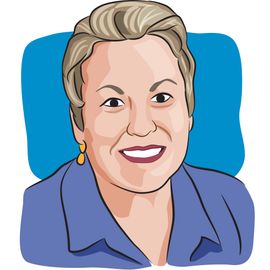- About Us
- Advertise / Support
- Editorial Board
- Contact Us
- CancerNetwork.com
- TargetedOnc.com
- OncLive.com
- OncNursingNews.com
- Terms & Conditions
- Privacy
- Do Not Sell My Information
- Washington My Health My Data
© 2025 MJH Life Sciences™ and CURE - Oncology & Cancer News for Patients & Caregivers. All rights reserved.
Mutant Tissue Wanted

Kathy LaTour is a breast cancer survivor, author of The Breast Cancer Companion and co-founder of CURE magazine. While cancer did not take her life, she has given it willingly to educate, empower and enlighten the newly diagnosed and those who care for them.
Meggan Keith, PhD, is taking matters—and breast cancer—into her own hands
Specifically, Keith wanted to look at researching why tissue carrying the mutation can become cancerous.
“I was told that because it was my tissue, I couldn’t work with it,” Keith says. “But the idea was there and didn’t go away.”
Keith learned that the tissue taken from women in her position—those with a mutation who had not yet developed breast cancer—would be banked as normal because there was no tumor at the time of surgery. She also knew that there were more and more BRCA-positive women undergoing prophylactic mastectomies, which led her to propose the creation of a new tissue bank at Albany, where the tissue from these women could be stored for research. (Other tissue banks exist across the country that collect normal breast tissue from women at normal risk, slightly elevated risk, and those carrying BRCA1 or BRCA2 mutations.)
“Making cell lines from this tissue will provide a source of BRCA1- or BRCA2-mutated cell lines that will let researchers study how normal cells carrying the mutations progress to become cancers,” Keith says. “My goal is to take tissue from women who know they have the mutation so we can start from a point that it’s not cancer, but we know it’s not normal.”
Martin Tenniswood, PhD, director of the Cancer Research Center, says the creation of such a bank, although painstaking and time-consuming, will provide a valuable resource for researchers interested in understanding the other environmental factors that might lead to cancer in women with the mutations.
Keith is currently seeking surgeons who perform prophylactic surgeries who would be willing to ask patients with the mutations to donate tissue, as well as women who are positive for a BRCA mutation who are considering preventive surgery. Keith can be contacted at mkeith@albany.edu.
Meggan Keith, PhD, a postdoctoral fellow at University at Albany’s Cancer Research Center, chose to research cancer because of a family history that included losing her mother, aunt, and grandmother to cancer. But the disease became more personal when Keith, who knew she carried the BRCA2 gene mutation, decided after numerous suspicious biopsies to undergo a prophylactic bilateral mastectomy in 2008 at age 28. Luckily, there was no cancer found, and, like any good researcher, she wanted to make good use of the tissue.
Related Content:



